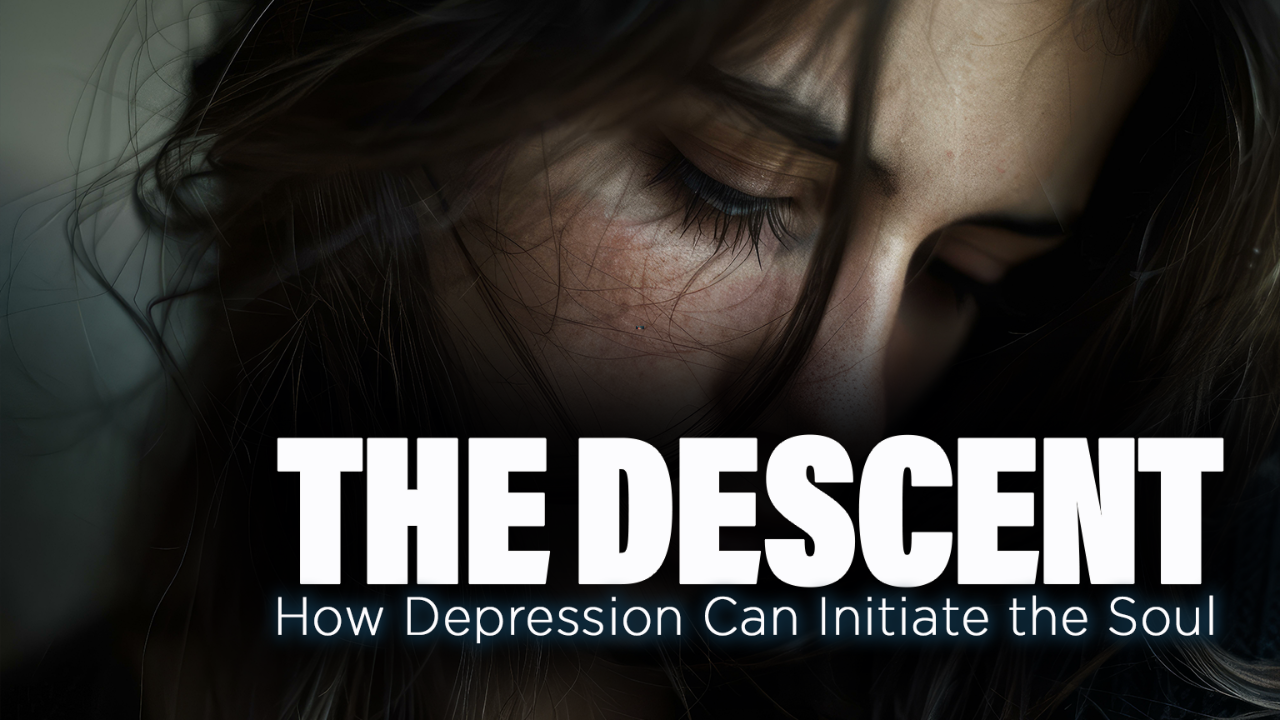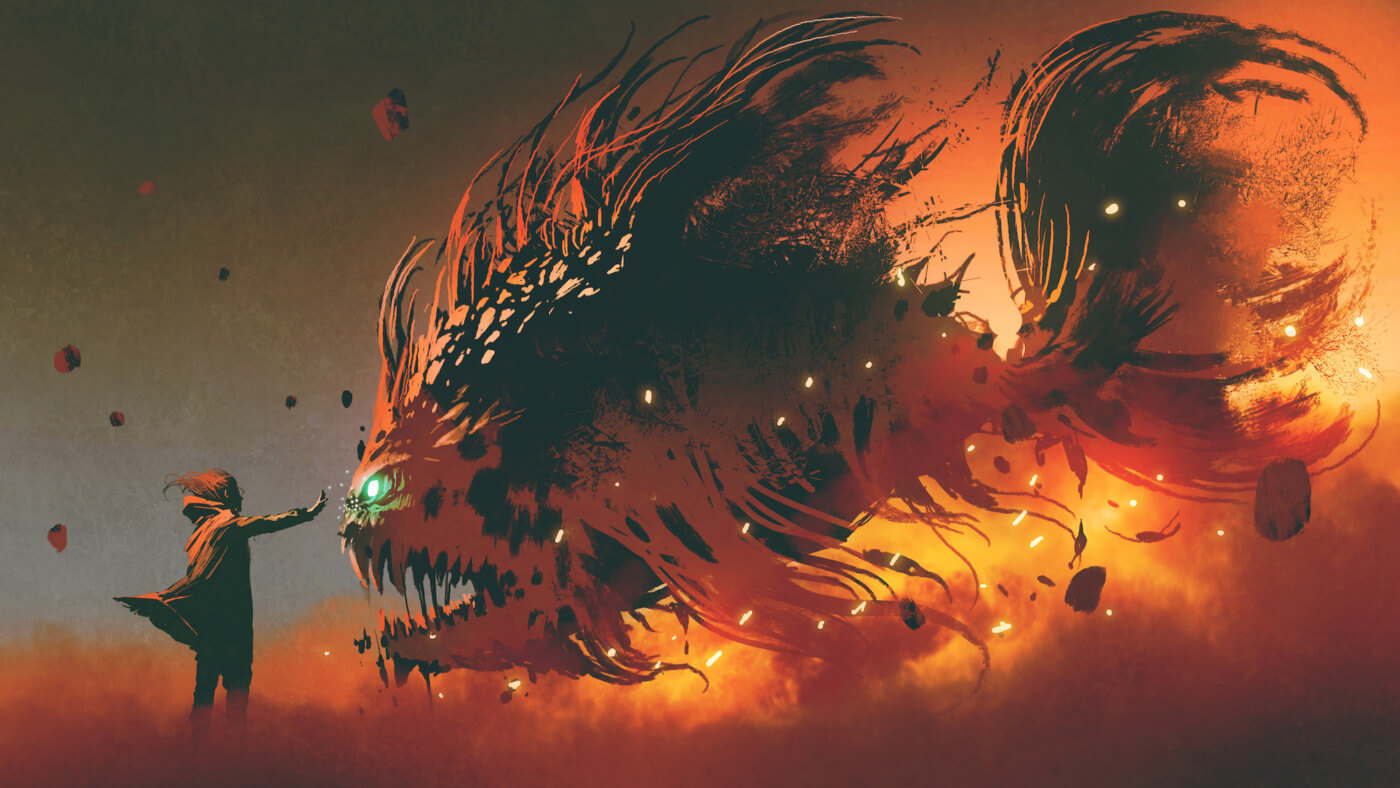Depression as Descent: How the Dark Night of the Soul Initiates the Human Spirit


Part I — The Descent
A modern reflection on how depression initiates us into the deeper layers of being.
It starts quietly.
The way winter takes a city.
The light drains early. Music dulls.
Your name feels heavier in your mouth.
At first, you call it stress.
Then fatigue.
Then nothing at all.
That’s when the descent begins.
The Ancient Story
In the old Greek myth, Persephone is gathering flowers when the ground splits open.
A hand reaches up from beneath the world and pulls her under.
The meadows close above her head.
The sun keeps shining for everyone else.
If you’ve ever lived through depression, you know that drop.
One moment you’re in the field of ordinary life, and the next you’re in the dark — unsure if you’re alive, or just remembering how it felt to be.
“The dark night of the soul,”
wrote St. John of the Cross,
“is the suffering that births illumination.”
The Hidden Function of the Fall
We’ve been taught that depression is a malfunction — a misfiring brain, a chemical glitch.
And yes, chemistry plays a role.
But recent research suggests something deeper.
Neuroscientists studying adaptive rumination propose that depression can act like a forced reboot — a slowing of the system that lets the mind reorganize when life’s complexity overwhelms it.
The brain’s energy drops not to punish, but to focus.
It’s an ancient conservation strategy: hibernate, reflect, reconfigure.
That’s what the ancients called descent.
Carl Jung described depression as “a woman in black,” not to be feared but listened to.
Mythologist Michael Meade adds, “The fall itself intends to change us from within.”
The psyche withdraws its light from the surface so we can meet what’s buried underneath.
In Living Mythically, we call this shift soul-centric. We deepen our stance and shift our orientation with life.
Our Culture Fears the Pause
We’re told to stay up: to manage, to optimize, to grind.
But the soul doesn’t care about productivity goals.
When meaning falters, depression presses pause — an enforced silence that demands honesty.
This is not failure.
It’s initiation.
The Myth as Mirror
Picture Persephone now, not as a goddess — but as someone you might know.
A thirty-something project manager.
Color-coded calendar.
Permanent exhaustion.
She’s walking home one night, earbuds in, mind on deadlines.
A notification pings. Her stomach knots. She ignores it.
Another. Then another.
She doesn’t notice the streetlight flicker — doesn’t see the crack opening beneath her sneakers.
By the time she looks up, the city’s gone quiet.
No cars. No sound. Just the hum of her own pulse.
That’s how descent begins in modern life — through burnout, heartbreak, diagnosis, or loss.
One way or another, the ground opens.
Something larger than the ego takes hold and whispers:
Come down here. We need to talk.
Reflection
Where in your life have you felt the ground open beneath you?
What parts of you have been trying to surface through the silence?
Write them down.
Let them speak.
The descent always begins with listening.

Depression as Descent
Part II — The Underworld
What happens when you stop fighting and start listening.
The Soul Beneath the Surface
Depression isn’t the opposite of vitality; it’s the midwife of depth.
When energy drops, awareness turns inward.
Studies on mindfulness and psychedelic therapy show that when the brain’s default-mode network — the system responsible for self-referential thought — quiets down, people often report relief, even awe.
In those moments of ego dissolution, depression lifts, not because the pain disappears, but because the self that was clinging to control lets go.
That’s what every initiation requires: the death of the small self so a larger one can be born.
“In growing the soul, the ego must die a little.” — Michael Meade
Depression enacts that dying.
It tears away the borrowed identities — employee, partner, hero, savior — until we’re left with the bare human underneath.
It’s brutal mercy.
From a biological angle, the same withdrawal that feels like failure might be repair.
Neuroimaging shows that depressive slowing activates regions tied to self-evaluation and problem-solving.
The mind is metabolizing experience.
It’s composting meaning.
Sitting With, Not Fighting Against
Acceptance is what turns the compost — the first step on the road to change.
In the RAIN In-Theater Process, we see again and again
the power of acceptance can’t be overstated.
It’s also the first step in most effective 12-step programs for a reason.
Acceptance doesn’t change what you feel; it changes how you hold it.*
A 2025 meta-analysis found that patients who learned to observe rather than suppress their feelings experienced lasting reductions in depression and anxiety.
In other words: stop fighting the storm, and you start to find your footing.
Acceptance isn’t passivity.
It’s participation.
It’s what Persephone does when she stops clawing at the rock and begins to look around.
In the myth, she finds the dead and listens to their stories.
That’s what sitting with depression is — listening to the parts of you that never had a witness:
the griefs you skipped,
the hungers you buried,
the rage you called weakness.
Where in your life are you clawing at the rocks of your suffering?
What would it look like to sit with the parts of you that are exiled — not to fix, but to offer authentic care?
Many fear that acceptance will trap them, but it’s resistance that binds.
When you cling to how things should be, you stay suspended above your own life.
Letting yourself fall into what is breaks the spell.
The moment you stop running from despair, it becomes doorway instead of dungeon.
“The only way out is through.
The only way through is in.”
— Turning Within: Reclaiming Your Soul from Shadow
The Weight of Grief
Often what we call depression is unexpressed grief.
We grieve people, of course —
but also possibilities, versions of ourselves that never arrived.
The job we thought would mean something.
The love that couldn’t stay.
The youth that slipped quietly out the side door.
Grief is how the soul digests loss.
When we deny it, depression swells to carry what we refuse.
Research on complicated grief shows that suppression prolongs distress; expression integrates it.
The tears we fear are the body’s way of releasing neurochemicals that calm the stress response.
Crying is regulation, not breakdown.
A system that resists grief creates unconscious strategies to protect itself from the cause:
I’ll never love again; it hurts too much.
But a soul that withholds love hardens.
In the myth, Persephone eats six pomegranate seeds before returning to the world above — each seed a fragment of what she’s learned to carry.
Grief works like that.
We don’t come back empty; we return with the seeds of our own wholeness.
By holding space for the parts of ourselves experiencing the dark night of the soul, we begin to reclaim what was lost.
In Celtic faith this was called soul retrieval.
We come back stronger from the journey.
It’s as if depression opens us to more of who we really are.
Reflection
Which griefs in you remain unspoken?
What would it mean to feel them without judgment — not as failure, but as passage?
Write. Breathe.
Let each tear be a pomegranate seed in your hand.

Depression as Descent
Part III — The Return
Integration, renewal, and the quiet power of meaning.
The Programming from Without
If descent is natural, why do we experience it as failure?
Because we’ve been trained to “solve” our humaning.
From childhood we inherit a script: be successful, be likable, stay happy.
Modern culture rewards surface, but the psyche measures truth.
When your outer story drifts too far from your inner one, depression arrives as correction.
We are creators taught to behave as consumers.
Even our understanding of suffering becomes a product — something to hack, fix, or medicate away.
That avoidance only delays a deeper reckoning.
Psychological studies confirm the cost of misalignment.
Those who chase extrinsic goals — image, wealth, approval — report higher anxiety and depression.
Those who live from intrinsic values — meaning, connection, growth — fare better.
Depression, then, may not be the problem but the body’s protest against a life lived off-center.
It’s the soul’s way of saying: I refuse to live a lie.
➡️ A deeper exploration continues in Humaning: The Art of Being Human.
The Turning Point
After months in darkness, Persephone hears something — a faint rumble above.
Spring is returning.
She climbs toward the light, not as the same girl who fell, but as a woman who’s learned the underworld’s language.
When depression begins to lift, it often feels like that:
small glimmers, cautious breath.
The ego, humbled, no longer imagines itself invincible.
The soul, seasoned, carries the wisdom of both worlds.
Research shows that people who recover through meaning-making — rather than avoidance — gain resilience and empathy.
They’re less reactive, more attuned.
They don’t take sunlight for granted.
Every descent has its ascent.
But you don’t climb out by force — you rise because you’ve integrated the dark.
Living Mythically
Turning Within is the practice of meaning mastery — not distraction, not dissociation, but engagement.
Through Living Mythically, we learn to cooperate with the patterns that shape experience instead of fighting them.
To live mythically is to recognize that the stories we inherited — progress, perfection, perpetual happiness — were never the whole story.
Real life moves in seasons.
Meaning comes from descent as much as achievement.
Depression, in that light, becomes a rite of passage into the soul’s adulthood.
It strips away illusions and delivers us back to the ground of being.
The goal isn’t to seek depression, but to stop treating it as an enemy when it comes.
The underworld isn’t punishment; it’s curriculum.
The modern world just forgot how to teach it.
The Return
When Persephone steps out of the underworld, her mother’s grief breaks and the earth blooms again.
The seasons are born from that reunion — loss and return, descent and renewal, forever intertwined.
Maybe that’s what healing really is: not a return to who we were, but the recognition that we can never be that person again.
Depression doesn’t restore innocence; it grants depth.
So if you find yourself in that underworld — numb, heavy, uncertain — don’t mistake the silence for absence.
Something is working there, slow and unseen.
The seeds are already in your pocket.
Wait. Listen.
When it’s time, you’ll rise — not as who you were, but as who you were trying to become all along.
Reflection
What seeds did you gather in your own darkness?
Which ones are ready to be planted now?
Name them.
Give them sunlight.
If this reflection resonated, explore:
- Turning Within — a framework for navigating your descent with awareness.
- Living Mythically — a guided practice for integrating meaning into daily life.
Walk with others who know the terrain.
You don’t have to travel the underworld alone.
Author’s Note
I am not a clinician. I write as a practitioner and witness of human transformation. First my own, and then walking beside many through their descents. Depression can be dangerous; I’m not suggesting you should traverse this path alone. Professional help is sacred. Finding a good therapist can be transformational.
If you need help, reach out for it. But in the end, you are the one who must take the journey.
Turning Within is not a therapy but a practice. It's a compass — a way to navigate the deeper parts of the soul, to orient within the dark night. The underworld is best traveled with allies — therapists, friends, guides — who hold the light until you remember your own.
Insights and tips delivered to your inbox every week.
No spam. Just helpful tips to make you more productive.




